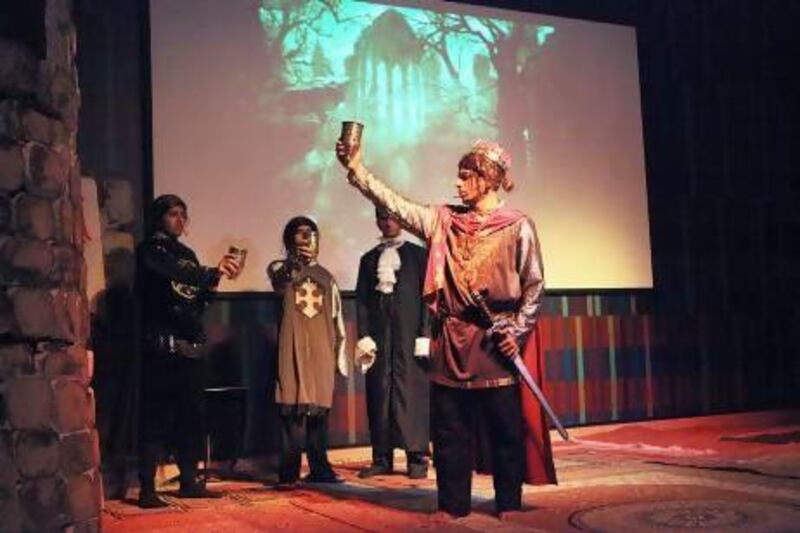ABU DHABI // By day, Ali Al Zaabi is a soft-spoken poet, a chemical engineering student who writes poetry and composes love songs.
By night, Ali plots to overthrow the Scottish king.
Last night Ali took to the stage in an Abu Dhabi adaptation of the Shakespearean tragedy Macbeth, performed by 15 Emirati engineering students at the Petroleum Institute.
Students such as Ali have found a connection and understanding of the English language in the words of the 16th century poet that no modern textbooks could teach them.
Ali played Macbeth's brother Daniel, a male substitution for Shakespeare's Lady Macbeth, the ambitious wife who urges her husband Macbeth to murder the king after a prophecy that he would rule medieval Scotland.
"He's a villain," said Ali. "Evil. I'm not like this. That's what's hard about this role. My life is different and I come here to change my personality. I really tried to be evil."
The biggest change of all was Ali's spoken English.
"I was a bad speaker," he said. "Shy, nervous. Yesterday we did the play in front of students and I think we made it. I got over it, the hesitation, everything."
His understanding has soared after hours watching film renditions of Macbeth to study his character.
The play was a substitute for the traditional English classes, heavy on books and grammar, but no less work. The first-year students practised five days a week for two hours a day over six weeks.
"They are motivated to get involved in the character," said their director and English teacher, Dr Nina Pasha-Zaidi.
"When you're actually teaching language it has to be experienced, and the best way to experience it is through some sort of activity. Theatre provides the perfect opportunity to do that."
A few hours before the performance, the students had a final rehearsal, reciting Shakespeare in kanduras and Ferrari baseball caps, fake chain mail and lace collars.
A student's voice from behind the curtains reminded his friends that, to get in character, "from now, until the end of the day, talk in English please."
Dr Pasha-Zaidi, gave them a few final pointers before the show.
"Dead bodies don't smile," she said. "I know it's fun but for the life of you, don't smile when you're dead."
They performed to a full house of academics, friends and family.
The show began with the national anthem and a video of dhows, camels and the Air Force, before the scene changed to a stony Scottish castle, with bagpipes and three green-faced wizards.
The scenes of murder, betrayal and the supernatural transcend language.
"Macbeth is as relevant here as it is to kids in England at the same age reading it. It's about perennial human emotions, perennial human conflict," says Colin Toms, an English lecturer at the institute's Advanced University Placement Department.
"They're constantly interacting with each other, interacting with us; it's as close as you're going to get to immersion.
"They're using it for a real-world purpose."
The Emirati Macbeth, Ahmed Al Ismaili, 18, says: "In a classroom you are just sitting and listening to a teacher.
"Really, I wasn't that much good at English but now every day I improve. I know that there are some mistakes I make, but day by day I improve it."






